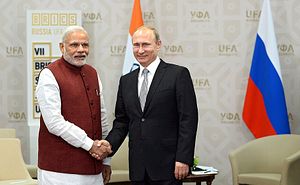On August 13, 2017, a senior Russian military official announced that Moscow would host comprehensive joint military drillswith India from October 19 to 29. This announcement gained widespread international attention, as Moscow’s October drills will coordinate with India’s army, navy and air force in a synchronized fashion for the first time. The timing of Moscow’s decision to expand its military cooperation with India is also intriguing, as the drill announcement occurred just days after Pakistan held negotiations with Russia on the purchase of S-35 war planes.
Russia’s decision to deepen its military cooperation with India and Pakistan simultaneously is a compelling example of Moscow’s balancing strategy in South Asia. Russia’s ability to maintain cordial security partnerships with both India and Pakistan is highly beneficial for its broader geopolitical aspirations.
Moscow’s successful balancing strategy in South Asia highlights Russia’s great power status to the international community, as it demonstrates that Russia can directly compete with the United States and China for influence in the Asia-Pacific region. Russia’s South Asian balancing strategy also ensures that both New Delhi and Islamabad support Moscow’s efforts to prevent instability in Central Asia and Afghanistan.
Moscow’s partnerships with India and Pakistan have been sustained by its efforts to address two key security challenges of mutual concern. The first major security issue that Russia has emphasized in its attempts to cement partnerships with India and Pakistan is that of combatting transnational terrorism.
Even though Indian politicians have routinely highlighted Pakistan’s sponsorship of terrorism as a major threat to regional stability and Pakistani media outlets have blamed rising Islamic extremism on India’s marginalization of Muslims, Russia has retained favorable relations with both countries by refusing to blame either country for the ongoing threat of terrorism in South Asia.
Instead of emulating the Trump administration’s accusatory approach, Russia has addressed the terrorism threat in South Asia by bilaterally engaging with the Indian and Pakistani governments on areas where they can implement constructive solutions. Russia’s counter-terrorism outreach to India has focused on the enforcement of stricter cross-border controls on the inflows and outflows of Islamic extremists. To convince the Indian government of Moscow’s commitment to cracking down on facilitators of terrorism, Russian President Vladimir Putin supported India’s counter-terrorism raid in Kashmir after the 2016 Uri attacks and openly praised New Delhi’s counter-terrorism policies during his meeting with Modi in June.
Even though Russia’s support for India’s counter-terrorism policies risks damaging its bilateral relationship with Pakistan, Moscow has eased concerns in Islamabad by highlighting Pakistan’s indispensability as a counter-terrorism partner in Afghanistan. Russian officials have argued that the Trump administration’s hostile rhetoric towards Pakistan risks destabilizing the region, and Moscow has given Pakistan a prominent diplomatic profile in the peace talks it has hosted on the Afghanistan crisis. These actions have reassured Pakistani officials of Russia’s impartiality in South Asia, and have caused Islamabad to support an expansion of Russia’s diplomatic presence in Afghanistan.
The second major security issue that underpins Russia’s South Asia balancing strategy is ameliorating India-Pakistan border tensions, which escalated markedly in 2016. Much like its approach to counter-terrorism, Russia has taken a non-committal approach to the re-escalation of the Kashmir conflict, by refusing to use its position on the United Nations Security Council to condemn either side for the rising hostilities.
While some analysts believe that Russia’s inaction on Kashmir in the UN Security Council constitutes a tacit pro-India stance, as Pakistan had appealed to the UN about casualties inflicted by Indian surgical airstrikes in Kashmir, Russia has highlighted its impartiality in the standoff by advertising itself as a potential mediator in the security crisis.
Russia’s potential to act as a mediator in the Kashmir conflict grew following a fruitful bilateral dialogue between Putin and former Pakistani Prime Minister Nawaz Sharif at the Shanghai Cooperation Organization (SCO) summit in June. Even though Pakistan has expressed more enthusiasm about a Russian mediation role than India, Moscow’s preference for bilateral dialogue between New Delhi and Islamabad, and opposition to judgmental resolutions from multilateral bodies has consolidated its South Asia balancing strategy.
Even though Russia’s economic and security links with India have greater geopolitical significance than those that bind Moscow to Pakistan, Russia’s use of constructive bilateral engagement on counter-terrorism and offer to mediate border tensions between New Delhi and Islamabad has allowed it to implement a highly effective balancing strategy in South Asia. If Russian diplomatic overtures help ease tensions between India and Pakistan, Kremlin policymakers will be able to expand Moscow’s access to vital new markets for Russian military equipment, highlight Russia’s great power status on the world stage, and demonstrate Russia’s ability to exert tangible influence in the Asia-Pacific region.
Samuel Ramani is a DPhil candidate at St. Antony’s College, University of Oxford. He is also a journalist who writes regularly for the Washington Post, The Diplomat and the Huffington Post. He can be followed on Twitter at samramani2 and on Facebook at Samuel Ramani. This article has previously been published on the EastWest Institute Policy Innovation Blog.

































